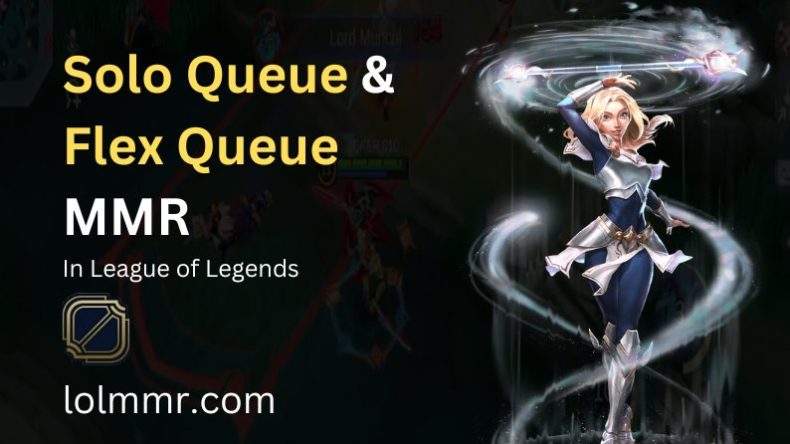Flex Queue And Solo Queue MMR In League of Legends
Flex Queue and Solo Queue are the Ranked modes in the MOBA game, League of Legends, both have an MMR system for balanced gameplay between players.

Quick Answer
League of Legends uses the MMR system in both Flex Queue and Solo Queue to match the players of the same and matchable MMR in Matchmaking. Both systems work separately.
Both systems work separately and these game Queues have different MMR calculations based on different factors, the best part is that you can use a third-party MMR checker to know the MMR of the Flex Queue and Solo Queue, the tool calculates MMR based on multiple factors.
Let’s discuss Flex Queue and Solo Queue MMR and their Matchmaking systems in depth.
Does Flex Queue And Solo Queue Have MMR?
Yes, both Flex Queue and Solo Queue have the Matchmaking systems and MMRs, which means that if you are playing Flex Queue, your team will be matched with the same MMR team in Flex Queue. Got it? Let me explain more in-depth.
How Does Flex Queue And Solo Queue MMR Work
Here is how Flex and Solo Queue MMR work in League of Legends.
Increase and decrease in MMR score of Flex and Solo Queue: There are pre-setted systems in both Flex Queue and Solo Queue that judge the players based on multiple factors.
If you are satisfying the pre-setted factors, then you can easily increase your MMR in League of Legends, but if you are not meeting them, you might see your MMR go down.
Note that the MMR calculation factors are hidden by Riot Games, the developer of League of Legends.
Matchmaking between players: First of all, the MMR system in games and League of Legends looks at the average MMR of each team, after that, the Matchmaking system combines similar MMR teams in the game for a better gameplay experience.
For Example: If you are 5 players in a party for Flex Queue, the League of Legends Matchmaking system will note down the MMR of each player.
1st Player MMR: 1300
2nd Player MMR: 1500
3rd Player MMR: 2000
4th Player MMR: 2500
5th Player MMR: 2100
Then they get the average of these players.
Average Process:
The sum of 5 players = 9400 (Note that this is an example of the above data)
Divide 9400 by 5 players to get an average = 1880.
So the average MMR of the party is 1880.
After this process, the MMR system assigns you the parties who have an average MMR of around 1880, that is how it works for the Flex Queue.
On another side the match-making system for Solo Queues is different.
In the Solo Queue, the League of Legends MMR system looks at the MMR of each player individually and then assigns them players of similar MMR and skills for competing with one another.
The player who has 1300 MMR will face the player who has around 1300 MMR in a Solo Queue.
Does Flex MMR Affect Solo MMR?
It is a common question does Ranked Flex affect solo MMR? The answer to this question is No, Flex Queue does not affect the MMR of Solo Queue. Note that both have different MMRs, so you should not think about it.
Let me explain more clearly.
For example: if you play in the Flex Queue, and lose a lot of games in a row or do not perform well, it will only affect your Flex Queue MMR, not your Solo Queue MMR.
The same process works for Solo Queues, which means that your MMR of the Flex Queue will not be affected because of loss streaks, bad performance, or anything in Solo Queues.
So don’t think about your Flex Queue MMR while playing Solo Queues and don’t worry about your Solo Queues MMR while playing Flex Q because both have different calculation factors and different match-making systems.
How To Improve Flex Queue And Solo Queue MMR?
The factors to improve the MMR are somewhat the same. Let’s dig deeper into it.
Improve Flex Q MMR
Here are some factors that can help you to increase your MMR in League of Legends Flex Queue.
Loss/Win Ratio: one of the official ways to increase MMR is to keep your win ratio more than your loss ratio, it should be win % > loss.
Try to win consistently: Maintaining a win streak is one of the big factors that influence MMR, try to win more games consistently, which means winning matches after one another and avoiding losing. As a result, you will see your MMR in Flex up.
Team Performance: As you know, in the Flex Queue, your teammates and you, play as a team, so your performance and as well as your teammates’ performance is very important.
Because If your team performs well against a team whose average MMR is higher than you, as a result, you will get more MMR.
On the other hand, if your team does not perform well and loses the game against the team whose average MMR is higher than you, it will cost you a decrease in your MMR.
Play with high MMR teammates: Play with teammates who have higher MMR than yours, this is another strategy that is used by most of the players in League of Legends to increase their MMR.
Here is how this strategy works; when you play with higher MMR teammates, you will face a high MMR opponent, and after performing well and winning the match against them, your MMR will increase more than before.
Note: these are not just factors, there are more hidden factors used by Riot Games while calculating and increasing your MMR (Matchmaking Rating).
Improve Solo Q MMR
The factors to increase Solo q MMR are similar to increasing MMR in the Flex Queue.
You have to maintain winning streaks, winning/losing ratio, and more. However individual performance is the factor that differentiates the Solo Queue MMR from Flex Queue.
Final Words
In short, Flex Queues and Solo Queues have different MMRs and Matchmaking systems.
Always keep in mind to win consistently and keep the ratio of wins more than the ratio of losses. Keep your eyes on your MMR score, audit your gameplays, and work on your weaknesses and skills.
Thanks for reading the whole article!!
